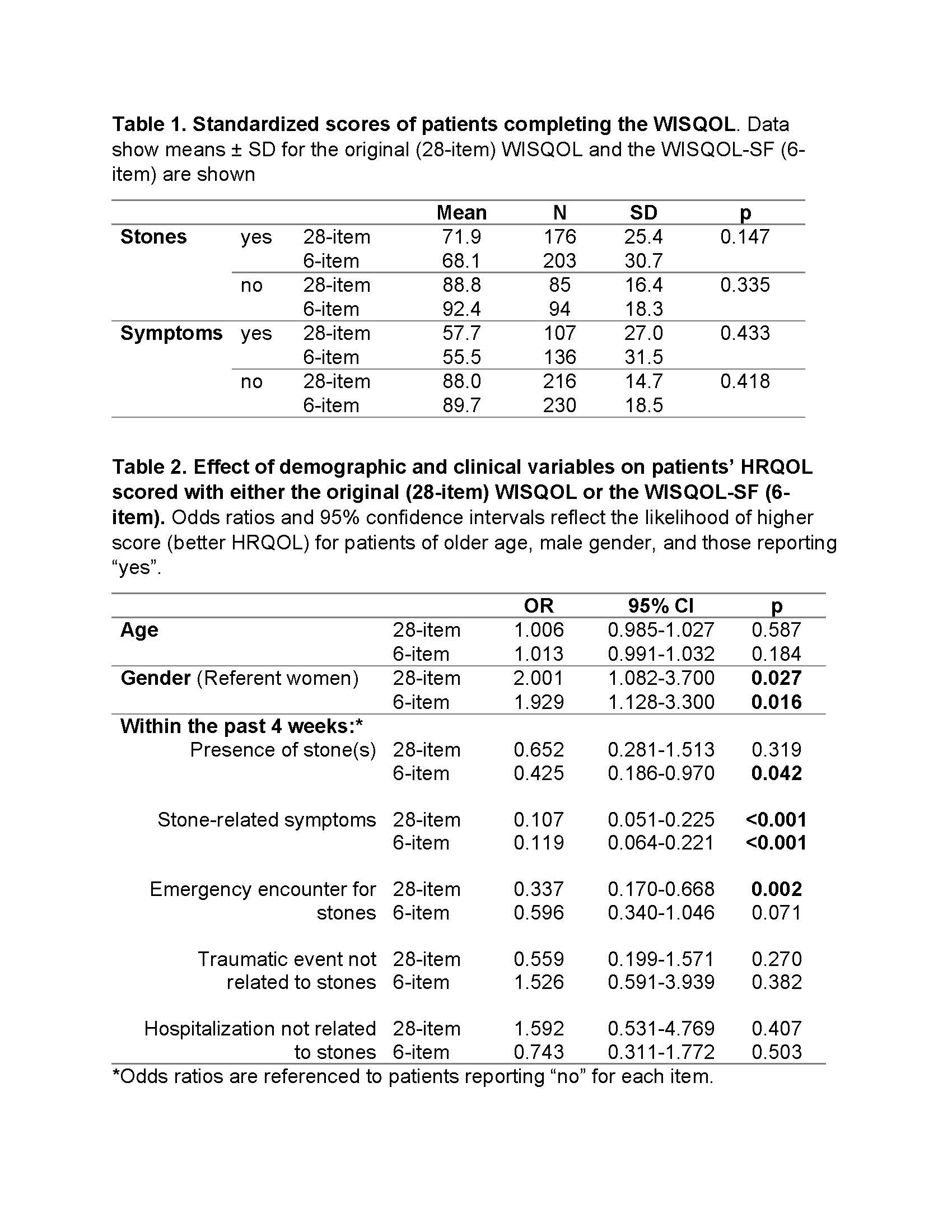Back
Poster, Podium & Video Sessions
Podium
PD50: Stone Disease: Epidemiology & Evaluation II
PD50-12: Preliminary Validation of the 6-Item Short Form of the Wisconsin Stone Quality of Life Questionnaire (WISQOL)
Sunday, May 15, 2022
5:20 PM – 5:30 PM
Location: Room 255
Shuang Li, Christopher Haas, Margaret Knoedler*, Stephen Nakada, Kristina Penniston, Madison, WI

Margaret Knoedler, MD
University of Wisconsin
Podium Presenter(s)
Introduction: The 28-item Wisconsin Stone Quality of Life questionnaire (WISQOL) is used to assess patients’ health-related quality of life (HRQOL) related to kidney stones. We developed a short-form (6-item) version of the WISQOL to meet providers’ needs for fast and reliable outcomes and reduce patients’ burden in reporting their HRQOL. Our aims were to (1) pilot the WISQOL-SF in a clinical population of stone formers, and (2) assess its congruent validity.
Methods: Patients are invited to complete the WISQOL at each appointment in our urology clinic. Patients (n=844) who completed the WISQOL between 06/2017-08/2021 were randomly split into 2 groups (422 patients each). Scores for the 28-item WISQOL were calculated for one group while those for the WISQOL-SF were calculated for the other. Two-way ANOVA was used to compare standardized scores for each group. The impact of age, gender, and presence of stone and symptom status at the time of WISQOL completion were examined using multivariate ordinal logistic regression by creating cutoffs of the standardized scores (20, 40, 60, and 80).
Results: Groups were similar for age (54.6±14.5 vs. 55.0±14.9 years, p=0.674) and sex (men 46% vs. 48%, p=0.535). In both groups, nearly half had self-reported current stones (49% vs. 50%, p=0.917), and nearly 1/3 in each group were experiencing stone-related symptoms within the past 4 weeks (30% vs. 34%, p=0.406). The internal consistency of the WISQOL-SF (Cronbach’s alpha = 0.944) was similar to the original (Cronbach’s alpha = 0.973). No significant differences for HRQOL were found (Table 1). The WISQOL-SF demonstrated the same gender differences as did the original WISQOL (Table 2) - men overall had higher HRQOL. Interestingly, while both instruments revealed significantly lower HRQOL among patients with symptoms at the time of the survey (Table 2), only the WISQOL-SF demonstrated differences between patients with and without current stones (p=0.042; Table 2).
Conclusions: The WISQOL-SF 6-item version demonstrates similar findings to the 28-item WISQOL. If further validity testing in broader, multi-center, prospective settings confirms these findings, the WISQOL-SF will be a valuable addition to current clinical and research tools for assessing patients’ HRQOL related to kidney stones.
Source of Funding: None

Methods: Patients are invited to complete the WISQOL at each appointment in our urology clinic. Patients (n=844) who completed the WISQOL between 06/2017-08/2021 were randomly split into 2 groups (422 patients each). Scores for the 28-item WISQOL were calculated for one group while those for the WISQOL-SF were calculated for the other. Two-way ANOVA was used to compare standardized scores for each group. The impact of age, gender, and presence of stone and symptom status at the time of WISQOL completion were examined using multivariate ordinal logistic regression by creating cutoffs of the standardized scores (20, 40, 60, and 80).
Results: Groups were similar for age (54.6±14.5 vs. 55.0±14.9 years, p=0.674) and sex (men 46% vs. 48%, p=0.535). In both groups, nearly half had self-reported current stones (49% vs. 50%, p=0.917), and nearly 1/3 in each group were experiencing stone-related symptoms within the past 4 weeks (30% vs. 34%, p=0.406). The internal consistency of the WISQOL-SF (Cronbach’s alpha = 0.944) was similar to the original (Cronbach’s alpha = 0.973). No significant differences for HRQOL were found (Table 1). The WISQOL-SF demonstrated the same gender differences as did the original WISQOL (Table 2) - men overall had higher HRQOL. Interestingly, while both instruments revealed significantly lower HRQOL among patients with symptoms at the time of the survey (Table 2), only the WISQOL-SF demonstrated differences between patients with and without current stones (p=0.042; Table 2).
Conclusions: The WISQOL-SF 6-item version demonstrates similar findings to the 28-item WISQOL. If further validity testing in broader, multi-center, prospective settings confirms these findings, the WISQOL-SF will be a valuable addition to current clinical and research tools for assessing patients’ HRQOL related to kidney stones.
Source of Funding: None


.jpg)
.jpg)